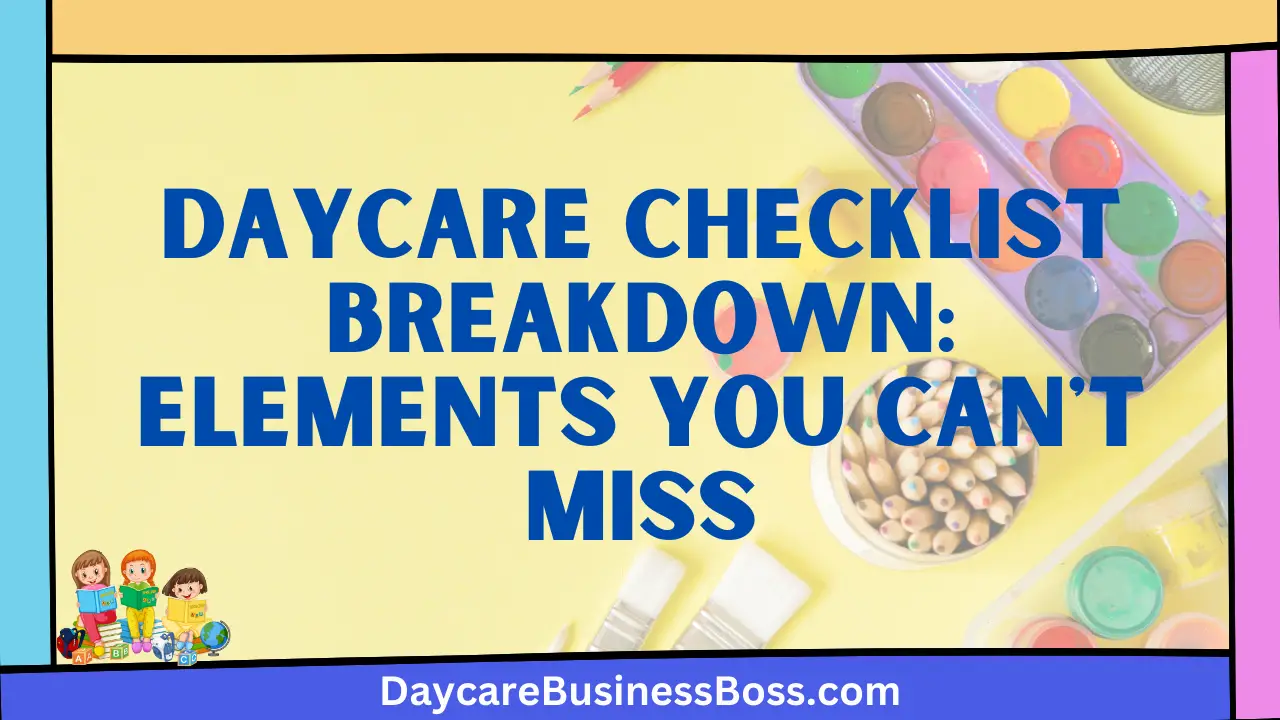Choosing the appropriate daycare for your child is a big decision that will affect their childhood and beyond. A well-structured daycare checklist is an essential tool in this process, providing a road map to guarantee that the chosen facility fulfills the highest safety, care, and development criteria. Parents are faced with the burden of determining the necessary ingredients that make a nurturing and enriching environment for their kids, with a plethora of factors to consider, ranging from safety priorities to qualified staff, a small child-to-staff ratio to stimulating activities.
The most useful elements in a daycare checklist include safety priorities, qualified staff, a small child-to-staff ratio, a clean environment, stimulating activities, balanced meals, hygiene routines, emergency plans, positive reviews, a convenient location, and licensing & accreditation.
Safety Priorities: A Cornerstone of Daycare Checklist
Prioritizing safety is critical in any childcare facility. A comprehensive daycare checklist includes a variety of criteria aimed at ensuring children’s general well-being. This includes developing age-appropriate safety regulations, rigorous childproofing measures, and regular practice of safety drills. The presence of easily available first aid kits, strategically located fire extinguishers, and properly maintained play equipment is essential for avoiding potential disasters and facilitating rapid reactions to unexpected crises.
A well-structured daycare setting creates a supportive environment in which children can thrive without jeopardizing their security by stressing physical, emotional, and psychological safety. Through these precisely prepared safety precautions, caregivers and parents alike may be confident that the children’s well-being remains the top priority, providing an environment that fosters healthy growth and development.
Qualified Staff: Nurturing Guidance
A vital component of any complete childcare checklist is ensuring the availability of qualified workers. Staff personnel having a background in early childhood education hold the key to understanding and meeting the unique needs of each child in their care. They encourage positive interpersonal interactions, foster emotional maturity, and smoothly integrate learning within the world of play through their skill. Thorough background checks and a commitment to ongoing professional development must be key components of the staff certification process, laying the groundwork for a safe and engaging environment for children.
These qualified experts contribute not only specific expertise but also the dedication and care required to create a nurturing and secure environment. The daycare environment informs parents and guardians that their children are in capable hands, receiving customized attention that supports their holistic development, by emphasizing the importance of well-trained workers. In this way, including qualified employees on the childcare checklist significantly improves the overall quality of care delivered.
Child-to-Staff Ratio: Individualized Attention
Maintaining a low child-to-staff ratio is an important cornerstone in childcare, giving customized care and careful supervision. This key aspect gives caregivers the ability to provide each kid with their undivided attention, which promotes not only their physical safety but also their emotional and cognitive growth. Children benefit from a more customized and caring experience that supports the formation of profound relationships when caregivers can focus on individual needs.
The consequences of this strategy are numerous. It not only serves as a safeguard against potential mishaps, but it also fosters meaningful connections and excellent learning chances. The presence of fewer children per caregiver allows for a deeper level of engagement, enabling exploratory play, skill development, and social development. As a result, the entire quality of the daycare trip improves, making it more meaningful and impactful for each kid.
Clean Environment: Health and Well-being

A clean and sanitary environment is critical to the health and well-being of children. A full checklist for daycare should include rigorous cleaning routines, stringent sanitary protocols, and prudent recommendations for handling food properly. This dedication to cleanliness not only minimizes the probability of contagious illnesses spreading among children but also serves as a platform for instilling appropriate hygiene behaviors in children from an early age.
The ramifications of preserving a pure environment go beyond mere aesthetics. A well-organized cleaning plan combined with strict sanitation standards provides a strong barrier against germs and pathogens that might harm children’s health. Developing these behaviors in a childcare setting creates the framework for children to absorb the importance of cleanliness, fostering lifetime practices that benefit their well-being as well as the well-being of the larger community.
Read more about: Creating a Nurturing Environment: The Essentials of Running a Thriving Daycare
Stimulating Activities: Cognitive and Creative Growth
In terms of a child’s overall development, the incorporation of stimulating activities appears as an essential aspect. A well-structured daycare checklist should emphasize the need of providing a variety of age-appropriate activities that promote cognitive, physical, and imaginative development. These carefully picked activities, which range from artistic endeavors to instructional games, serve as catalysts for stimulating curiosity, honing problem-solving abilities, and providing channels for self-expression.
Caregivers help the holistic development of children in a variety of ways by incorporating varied activities into the daily routine. Children’s cognitive skills improve as they solve puzzles and participate in educational challenges, while physical activities promote motor skill development and healthy lifestyles. Meanwhile, creative pursuits encourage creativity and originality while instilling a strong sense of achievement and pride.
Balanced Meals: Nourishing Growth
Recognizing the critical role that nutrition plays in the holistic development of children, it is clear that a well-structured daycare checklist should prioritize the inclusion of balanced and nourishing meals. This includes rigorous menu planning that addresses not just dietary choices but also allergies and limits, developing healthy eating habits, and ensuring appropriate sustenance for both bodies and minds in their early phases.
A well-balanced diet has a far-reaching impact on children’s well-being. Caregivers promote physical health, cognitive growth, and emotional stability by stressing the provision of nutrient-rich meals. A carefully designed cuisine ensures that children get the vitamins, minerals, and energy they need for optimal growth and learning.
Hygiene Routines: Healthy Habits
Introducing and instilling healthy hygienic habits at a young age appears as a critical task. It is critical to define consistent routines for behaviors such as handwashing and toothbrushing within the scope of a daycare checklist. Instilling personal hygiene knowledge in children goes beyond germ avoidance; it serves as a foundational step toward cultivating habits that will last throughout their life, ultimately contributing to their overall well-being.
Caregivers play a critical role in protecting children’s health and future by including cleanliness measures in their everyday routine. Handwashing regularly not only reduces the risk of sickness but also promotes responsibility and awareness. Similarly, brushing not only promotes dental health but also develops behaviors of self-care and discipline.
Emergency Plans: Preparedness and Swift Action
Having a checklist for childcare that does not include comprehensive emergency measures is essentially insufficient. These protocols, which were painstakingly constructed, should cover a broad variety of possible occurrences, including but not limited to fires, natural catastrophes, medical emergencies, and lockdown situations. The plan for these techniques is extremely important for building an organized approach that protects professionals as well as children when a crisis occurs.
In this setting, regular practice sessions are of critical significance. Not only do these practice sessions emphasize preparation, but they also help fine-tune the synchronization that is required for efficient execution. It is also crucial to maintain open lines of communication with the parents to guarantee that all parties involved are properly informed and comprehend the safety procedures.
Positive Reviews: Testimonials of Trust

When assessing the reliability and quality of daycare, the existence of favorable comments from parents and guardians appears to be an essential component to take into consideration. The inclusion of favorable evaluations in the daycare checklist is highly crucial even though they are intangible. This is because they offer parents with the practical assurance they need to commit their children to the facility. The praises and suggestions of other families are a valuable source of information regarding the daycare’s strengths and areas in need of better, which encourages a continuing cycle of refinement and growth.
By including favorable evaluations on the checklist, caregivers demonstrate that they appreciate the significance of word-of-mouth recommendations in the process of building trust. These recommendations are actual testimonials that speak to the daycare’s commitment to providing outstanding care and a nurturing atmosphere for the children who attend. These are representations of the real-life experiences that the parents have had, lending credibility to the daycare’s reputation.
Read more about: Crafting an Effective Daycare Marketing Budget: Insights and Strategies
Convenient Location: Accessibility Matters
The geographical location of daycare has a significant impact on the daily routines of parents. The location of daycare is an important aspect that has a direct impact on the ebb and flow of a family’s schedule. Choosing a central or easily accessible location not only allows for smooth drop-offs and pick-ups but also reduces stress for both parents and children. Recognizing and incorporating this specific element in the daycare checklist displays an understanding of the critical importance of geographic accessibility.
Caregivers demonstrate an awareness of the delicate interplay between a family’s logistics and their childcare needs by incorporating location as a critical consideration. The ease of a well-located daycare not only streamlines routines but also contributes to both parents and children’s overall experience. It reflects the daycare’s dedication to being a helpful partner in the complicated tapestry of a family’s everyday existence.
Licensing & Accreditation: Meeting Standards
A daycare’s compliance with the standards that are mandated must be attested to by several important elements, including licensing and accreditation. The incorporation of this essential component into the daycare facility’s checklist provides parents with a tangible assurance that the institution works by specified norms covering safety protocols, personnel certifications, curriculum standards, and more. These formal designations are a clear demonstration of the daycare’s dedication to upholding quality standards and following the most effective procedures prevalent in the business.
Caregivers demonstrate an understanding of the utmost value placed on maintaining professional standards when they arrange the items on the checklist from most important to least important. This designation demonstrates that the daycare is not only in compliance with the law but also invested in creating a safe and organized atmosphere that supports the children’s overall growth and development. The provision of a high-quality educational experience, with the health and development of the children in charge, can provide parents the peace of mind they need to feel comfortable leaving their children in the care of a daycare that possesses a valid license.
Frequently Asked Questions

What is the significance of a clean atmosphere in a daycare setting?
A clean environment in a childcare setting is critical for children’s health and well-being. Regular cleaning and sanitation techniques assist to keep germs and illnesses at bay, creating a safe environment for children to play and study. A clean environment also teaches children at a young age the significance of hygiene and cleanliness, laying the groundwork for lifelong habits.
How does the child-to-staff ratio affect children’s daycare experiences?
The child-to-staff ratio has a considerable impact on the quality of care and supervision provided to children in daycare. A lower ratio guarantees that caregivers can offer each kid individualized attention, building stronger ties and a greater awareness of their needs. Children have greater opportunities for meaningful interactions, learning, and discovery when they are properly supervised, which contributes to their overall development.
What function do licensing and accreditation play in a daycare center?
Licensing and accreditation are important markers of a daycare center’s compliance with set norms and regulations. A licensed daycare meets certain safety, worker certification, curriculum, and other requirements, offering an organized and secure environment for children. Accreditation from renowned organizations affirms the daycare’s dedication to excellence and assures parents that their children are in skilled hands.
To learn more on how to start your own daycare checkout my startup documents here.
The information provided by DaycareBusinessBoss.com (“The Site”) is for general informational purposes only. All information on the Site is provided in good faith, however, we make no representation or warranty of any kind, express or implied, regarding the accuracy, adequacy, validity, reliability, availability or completeness of any information on the Site. Under no circumstance shall we have any liability to you for any loss or damage of any kind incurred as a result of the use of the Site or Reliance on any information provided on the Site. Your use of the Site and your reliance on any information on the Site is solely at your own risk.
This blog post is for educational purposes only and does not constitute legal advice. Please consult a legal expert to address your specific needs. Terms and Conditions. (https://daycarebusinessboss.com/terms-conditions/)

Meet Shawn Chun: Entrepreneur and Childcare Business Fan.
I’m a happy individual who happens to be an entrepreneur. I have owned several types of businesses in my life from a coffee shop to an import and export business to an online review business plus a few more and now I create online daycare business resources for those interested in starting new ventures. It’s demanding work but I love it. I do it for those passionate about their business and their goals. That’s why when I meet a childcare business owner, I see myself. I know how hard the struggle is to retain clients, find good employees and keep the business growing all while trying to stay competitive.
That’s why I created Daycare Business Boss: I want to help childcare business owners like you build a thriving business that brings you endless joy and supports your ideal lifestyle.


